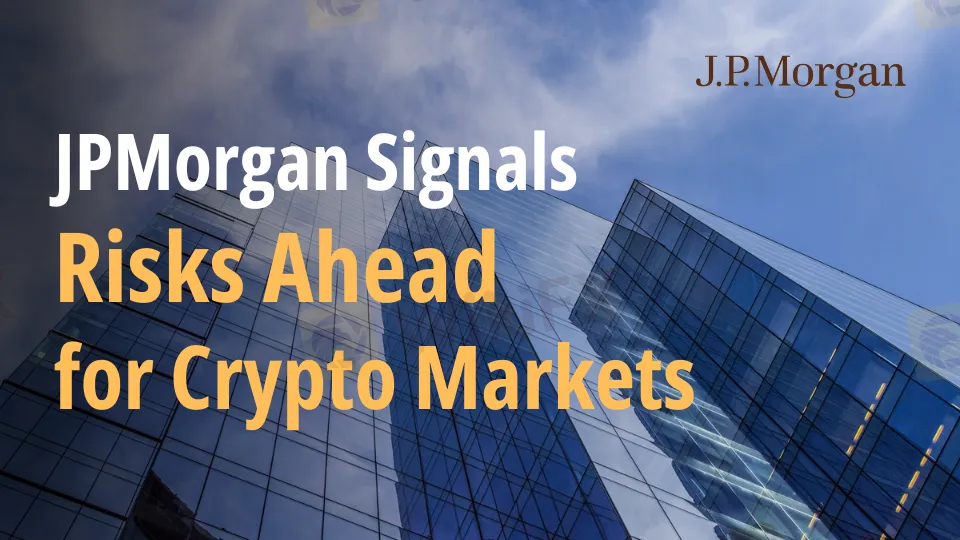简体中文
繁體中文
English
Pусский
日本語
ภาษาไทย
Tiếng Việt
Bahasa Indonesia
Español
हिन्दी
Filippiiniläinen
Français
Deutsch
Português
Türkçe
한국어
العربية
JPMorgan Signals Risks Ahead for Crypto Markets
Abstract:JPMorgan highlights risks in crypto markets due to low VC investment and the SEC's hesitancy on Ethereum ETFs.

JPMorgan Chase, a prominent multinational financial institution, has made a serious cautionary statement on the safety of the Bitcoin marketplace. The research identified a significant deceleration in the level of venture capital allocated to the cryptocurrency sector, a factor considered vital for maintaining the long-term stability of cryptocurrency values.
Analysts at JPMorgan, among them the well-known managing director and global market strategist Nikolaos Panigirtzoglou, have noted that the slow venture capital moves thus far this year stand in sharp contrast to the levels seen in prior years. “We had previously argued that a recovery in crypto VC flows is a necessary condition for a sustained recovery in crypto markets, so in our minds, the subdued VC flows YTD pose a downside risk,” said Panigirtzoglou.
The excitement in venture capital has subsided, but the environment for cryptocurrency hedge funds is quite different. These funds have shown rapid growth, with their assets under management rising to an estimated $20 billion in the last half-year, indicating a change in the direction of the financial power consolidation in the cryptocurrency space.

The research upheld JPMorgan's cautious view on near-term prospective gains in well-known cryptocurrency products like exchange-traded funds (ETFs), despite the growing influence of hedge funds. The experts expressed a diminished probability of the approval of a spot Ethereum ETF within the next month. The continuing investigation launched by the Securities and Exchange Commission (SEC) on the Ethereum Foundation has heightened the experts' distrust. This inquiry has resulted in a decrease in market confidence, as seen by the growing decrease in the net asset value (NAV) of the Grayscale Ethereum Trust.
In contrast, JPMorgan's projection shows a rather optimistic outlook. Gary Gensler, the chairman of the Securities and Exchange Commission (SEC), has not responded to a recent request for clarity from forty-eight senators in the United States about the classification of Ethereum as either a commodity or a security.
The analysts maintain their longer-term optimism, arguing that the same legal road might eventually lead to SEC approval for Ethereum products, just as litigation helped to make Bitcoin ETFs possible. This optimism seems to harbor a sliver of hope that cryptocurrency investment and regulatory environments may eventually converge more favorably.
JPMorgan's study is a sobering reminder of the difficulties that lie ahead as the cryptocurrency market continues to thread its way through a complicated web of financial, legal, and market forces. The market has the potential to provide significant profits, but it is becoming more and more obvious that managing it will require a sophisticated grasp of both its volatile character and the complex regulatory framework that controls it.

Disclaimer:
The views in this article only represent the author's personal views, and do not constitute investment advice on this platform. This platform does not guarantee the accuracy, completeness and timeliness of the information in the article, and will not be liable for any loss caused by the use of or reliance on the information in the article.
Read more

Five UK Financial Firms Collapse, FSCS Offers Support for Affected Clients
Following the collapse of five regulated firms, the FSCS steps in to protect clients through compensation covering deposits, insurance, and other financial services.

CBEX Exposed as Ponzi Scheme, Thousands in Nigeria Affected
Thousands of Nigerians have been defrauded by CBEX, a crypto investment platform posing as a legitimate exchange. The scheme collapsed in April 2025, leaving users unable to withdraw funds.

Why Are More Regulated Brokers Providing Free VPS Services?
Discover why more regulated brokers are offering free VPS services, enhancing trading efficiency, reducing costs, and improving client retention in the competitive trading market.

Hong Kong Warns of CBEX Group Fraud Amid Nigerian Outrage
Hong Kong's 2024 alert revealed CBEX Group's fraudulent activities, misleading investors in Nigeria and beyond. Many face significant financial losses and withdrawal issues.
WikiFX Broker
Latest News
Five UK Financial Firms Collapse, FSCS Offers Support for Affected Clients
Why Trade Agreements Matter to Nations
Non-Existent Online Scheme Took Away RM580,000
RM15 Million Gone in Fake Investment Scam
Crypto Traders Hit by Scam Using Fake Regulatory Documents, MFSA Cautions
Trade Fights Are Heating Up—What Happens Next?
Juno Markets Upgrades to FYNXT PAMM
Think Scams Won’t Happen to You? That’s Exactly What Scammers Count On
Beware of New Scam Tactics Lurking on WhatsApp!!
Italy’s CONSOB Blocks Sites of ITradingFX and NEX TRADE in Latest Crackdown
Currency Calculator


